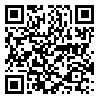BibTeX | RIS | EndNote | Medlars | ProCite | Reference Manager | RefWorks
Send citation to:
URL: http://jdm.tums.ac.ir/article-1-5131-en.html

 , Behzad Zolfaghari
, Behzad Zolfaghari 
 , Bahareh Tahani *
, Bahareh Tahani * 
 1, Mostafa Emami Doost
1, Mostafa Emami Doost 
 , Mehrdad Forohande
, Mehrdad Forohande 

Background and Aims : Dentists have usually a critical role in diagnosing oral cancer lesions in their early stages. In this study we aimed to assess the senior dental student’ and dentists’ knowledge, attitude and behaviors regarding oral cancer in Isfahan.
Materials and Methods: A valid and reliable self-administered questionnaire was designed to assess the current practice, knowledge and attitude of general dentists working in Isfahan-Iran and senior dental students regarding oral cancer lesions. The questionnaire was consisted of questions to assess the knowledge and attitude regarding diagnosis, risk factors and prognosis of oropharyngeal cancerous lesions. The frequencies of answers to questions in sections of practice and attitude (just for dentists) and sum score of questions in knowledge section were calculated and compared using statistical analysis regarding age, sex, duration of experience and practice setting ) p ublic/private) of participants. Data were analyzed using ANOVA, chi-square, linear regression and logistic regression.
Results: 139 questionnaires from dentists and 57 questionnaires from students were returned. The mean score of dentists’ knowledge was 5.41 out of 13 (CI95%=5.03-7.79 ). Significant differences were observed among dentists regarding their experience (P=0.001). Only one fifth of the dentists in our survey reported to perform oral cancer examination for all of their patients in age of 40 and above and just about 34% of dentists gained acceptable level of knowledge. Among senior dental students, the status of knowledge was better as about 58% of them gained the level of acceptance (P=0.01).
Conclusion: Although dentists were willing to follow the diagnostic protocol for oral cancer, they were mostly unsatisfied with the level of their knowledge. Therefore, this study highlights the need for educational planning and training activities in general dentists with regard to the risk factors and early detection of oral cancers.
Received: 2013/04/10 | Accepted: 2014/01/21 | Published: 2014/02/12
| Rights and Permissions | |
 |
This work is licensed under a Creative Commons Attribution-NonCommercial 4.0 International License. |


